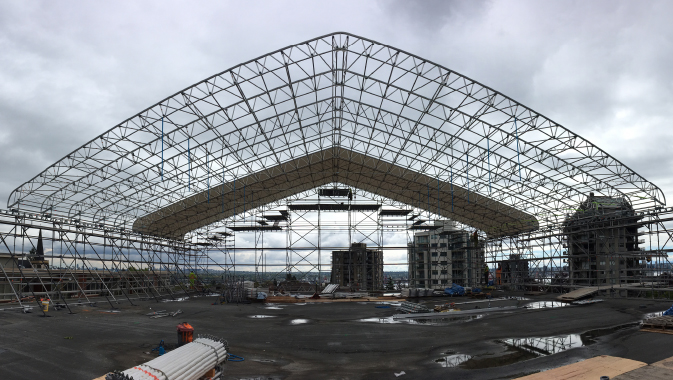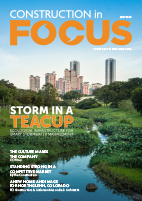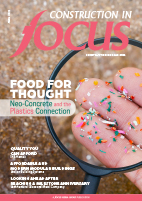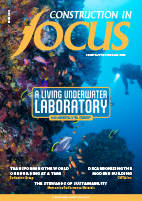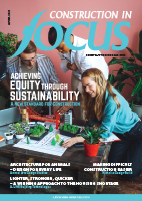Most people view scaffolding as simply a sign that a building is being constructed or renovated. For Skyline Scaffold, Ltd., of Delta, British Columbia, scaffolding is something of an art form that, if done properly, will ensure the safety of those on or near the jobsite and create efficiencies on a project that save both time and money.
~
“Scaffolding is about providing safe access, enclosures, and containments. We carry only the best equipment, and we put our customers’ needs front and center. We want to make sure, at the end of the day, that our employees and our customers’ employees get home safely,” says Skyline President and Founder, Arka Chorbajian.
The firm offers scaffold solutions for high and low-rise apartments, industrial plants, commercial buildings, academic facilities, bridges, and more. Skyline’s highly trained workforce uses only top-quality equipment from the German firm Layher Scaffolding. Skyline uses a combination of public access stairs, temporary roof systems, System Scaffold, City Super Frame sidewalk hoardings, both solid and fabric containment systems, and more, to ensure the right solution for its clients.
“We’re a speciality firm. We don’t regard scaffolding as a commodity. There are competitors out there who do. They really don’t offer anything above and beyond basic needs,” says Arka.
Most of Skyline’s projects are carried out in and around the Lower Mainland, the part of British Columbia that surrounds and includes the city of Vancouver. Within the region, the company has taken on high-profile projects involving SkyTrain, a primary public transit network in Vancouver, Vancouver International Airport, The Empire Landmark demolition, and the Pattullo Bridge. In all projects, regardless of scale, there is a commitment to safety, quality, and innovation. Skyline’s use of 3D modeling and AutoCAD ensures that the scaffold will meet or exceed the requirements of the project.
“We’ve never come across a project that we can’t do. We try to key into projects that others either don’t want, or can’t do,” notes Arka, proudly. His passion is driven by personal interest. “I just love scaffolding, and I surround myself with highly-skilled people that share my passion.” he says.
Growing up, his father worked for a scaffolding company. When Arka was seventeen years old, his father secured him a summer job at the same company, where he toiled in the equipment yard. It was mundane work but gave the teenager a glimpse of the possibilities presented by the sector. “I would see these scaffolders pulling up in trucks full of scaffolding equipment, and they were the rock stars of the company. I had a couple of opportunities to go out with them. As a kid who grew up building Meccano toys, I thought this was really cool – I’m going to get paid to build giant, life-sized toys,” he recalls.
Arka went to school, where he studied finance, accounting, and business management. After finishing his studies, he worked in various jobs and then decided to strike out on his own. This led to the launch of Skyline Scaffold, Ltd. in 1994.
Like many entrepreneurs, he had big dreams but limited assets. In the beginning, the company had a single truck and used rented gear. Through hard work and perseverance, it slowly grew. “We’ve been through ups and downs, and we have been through a couple of business cycles. The company has prospered through good and bad times, and we have never lost sight of our goal: to be the best scaffolding provider in our market,” he says.
Along the way, he made some crucial decisions that had a huge positive impact. One decision involved replacing the equipment the firm was using, which was mostly built by offshore manufacturers. About a decade ago, Skyline experienced an equipment failure. While it did not involve any casualties, it prompted Arka to change suppliers. “I said at that point, ‘If I am going to be in business, I am not going to do this anymore.’ To buy the equipment that we wanted, our costs more than doubled. I thought to myself, ‘I am in the life safety business; scaffolding is the epitome of life safety,’” he recalls.
He decided then to only acquire scaffold products and accessories from Layher, which has a reputation for its high-end, German-built equipment that is made to ISO specifications and put through rigorous testing. Being top-of-the-line, Layher equipment is also pricey. “We buy the best gear money can buy, regardless of cost. That makes it really difficult to operate in a super competitive environment, but that is the choice we made. It’s a guarantee that we make as a company. We believe our employees deserve to work with the best gear and that our customers deserve the same,” he explains. “One of the things that make us different is that we never compromise the safety or quality of our equipment, or the safety or quality of our builds.”
Skyline’s devotion to quality extends to even the smallest elements. The firm uses only stainless steel anchors, for example. These anchor the scaffolding in place against a structure, to secure the scaffold for its intended use. Using tie-ins made from stainless material means the tie-ins will not rust and mark the surface of a building. This is particularly important in the region’s wet climate for both historical buildings and new construction.
The Layher products are modular, strong, flexible, and easy to assemble and disassemble. They also include safety and ergonomic features to avoid worker injury. Using only quality equipment means the company can do complex, challenging projects “in a much safer way than anyone else,” says Arka.
Skyline workers are also kept safe through extensive training, supervision, and a company culture that emphases the motto, “Safety, Quality, then Quantity”, in its approach to each and every task. The company employs a full-time Safety Manager and CSO who works closely with the Construction Manager and field supervisors to ensure the safety of all workers in the field, yard and office. The firm is conscientious of public safety and accessibility as well, and this is an important element of the company’s business model, especially when crews have to work around power lines or around traffic and pedestrians. The team consults with clients to establish the safest, most efficient pedestrian and traffic access routes and systems.
The company treats its equipment with respect and maintains a tidy, well-organized yard. “Every piece of equipment is counted and checked. If it’s damaged or flawed in any way, it does not go back into service. We have a scrap program. We will repair where possible, but we always err on the side of caution. We do not bend material back into shape if it means compromising that material,” explains Arka.
Innovation is a core company tenet, and recently, Skyline began incorporating a cutting-edge Keder XL roof system from Layher. “It’s far and away the best roof system on the market,” says Arka. Made from lightweight but strong aluminum parts, the Keder roof system can be easily assembled and is flexible and versatile. The system offers workers weather protection during construction or renovation operations and can handle spans up to 145 feet. Skyline used the Keder roof system for a large industrial plant in Western Canada that was in need of a new roof. The company designed, built, and engineered scaffolding for the project using the Keder roof system to facilitate construction. As a result, the roof was replaced quickly with no construction days lost to bad weather, even in wintertime.
Based on a growing reputation, Skyline continued to expand, but expansion led to additional challenges. Arka found himself taking on too many responsibilities. Among other business tasks, the founder undertook most of the estimating, shipping, purchasing, and invoicing, and was feeling overwhelmed.
“We grew to about thirty people, but things were falling between the cracks. Even though we didn’t have much overhead, we also didn’t have systems and processes in place,” he recalls. So, roughly six years ago, Arka brought in Jeff Remfert to serve as Skyline’s General Manager. It was a big step and not just because Jeff could share some of the workload. “Jeff has skills that I didn’t have. I think every business owner needs to hire someone who exceeds their ability in a given area, who can teach them things,” says Arka. “Hiring Jeff allowed us to grow in the area of systems and processes. You cannot grow in a focused way without strong systems in place.”
Now, the founder is able to focus on sales, estimating, and business development, and a strong management team takes care of the rest. New administrative systems that streamlined work and increased efficiency were also introduced. The company incorporated business methodologies favoured by multinational corporations, including KPMG auditing models and processes for handling inventory and accounts receivable, among other things. While adopting internal structures that are more common to multinationals, Skyline doesn’t share other similarities in that it’s able to remain lean and local.
“We’re putting our talents and efforts into one location, and our focus is on excellence within one skill set: scaffolding. We don’t sell equipment; we’re not a distributorship. I have competitors who sell and distribute equipment too. And we’re not owned by a multinational, with headquarters in some far-off locale with hard-to-reach staff,” he says.
“We’re now closing in on eighty employees, plus ten to fifteen subcontractors,” says Arka. Having this relatively compact workforce means Skyline can move quickly and adapt to changing client needs or work conditions. As this is a British Columbia-based firm, customers in the Lower Mainland receive personalized service.
Arka says that Skyline has over $10 million worth of assets. This ensures the company has sufficient gear to set up comprehensive scaffold systems quickly, without having to order product from a supplier before commencing work.
Skyline’s reputation for one-on-one client contact underlines its approach to promotion. “We just don’t advertise. We have a very good client list. We’re operating flat out, pretty much ninety-five percent capacity all the time,” says Arka. To a great extent, the company generates new business from referrals (in addition to repeat business) from satisfied clients. This word-of-mouth has been vital to helping the company succeed, as has the exposure Skyline receives from major projects, such as its high-profile work on the Pattullo Bridge, which links the communities of Surrey and New Westminster.
“It was an aging bridge, with a lot of concrete issues, and TransLink decided, ‘Okay, it’s time now to do a deck repair because the bridge is well past its best-before date.’ We provided suspended access for about one kilometre. We had to build it in a method that would still allow our clients to use large portions of the bridge, without putting them at risk,” says Arka.
The firm has also taken on work for SkyTrain. “We’ve done lots of work on multiple SkyTrain stations over several years. It’s real specialty work. You have to work around energized tracks, and you cannot impede pedestrian traffic. There are thousands of people in a station on any given day. There are a lot of public access systems used on these jobs. It’s tricky, specialty work but we do more of it than anybody else,” says Arka.
For all of its forward momentum, the firm is facing some stiff challenges, including the fact that young people are not flocking to take on construction jobs. “There are not enough young workers that want to be in construction. To that end, we’ve got a mentorship program. We’re working with the Squamish Nation Trades Centre to recruit, train, and nurture young workers,” he says of the institution for the group of indigenous communities in British Columbia. “Our foremen are not just on site to build scaffolds; they are there to train new, young workers. Train them how to be safe, how to be productive – how to be a good member of the team.”
Training new workers is one thing, but housing them is another. The Vancouver area has extremely high housing costs which can make it difficult to convince people outside the region to work with Skyline. So, Arka came up with a solution. “We bring skilled people in from out of province, and we house them for several months free of charge, to get them on their feet,” he explains. “Even though it’s a considerable cost, this allows us to bring people into the market that otherwise would not be here.” This unusual housing arrangement is another good example of how the company embraces innovation and specializes in coming up with practical solutions to tricky problems.
Arka is determined to maintain the company’s focus on regional projects and scaffolding work. “We want to focus on what we do best and expand. Our core business is providing the highest quality scaffolding products and services on the market. It’s a big enough market [in BC] that we can keep focusing in on infrastructure, which is a real niche business for us: transit, bridges, institutional work, some commercial,” he says.
As for the future, Arka is definitely ambitious: “I see us in the next couple of years being able to potentially grow to 150-plus people.”

